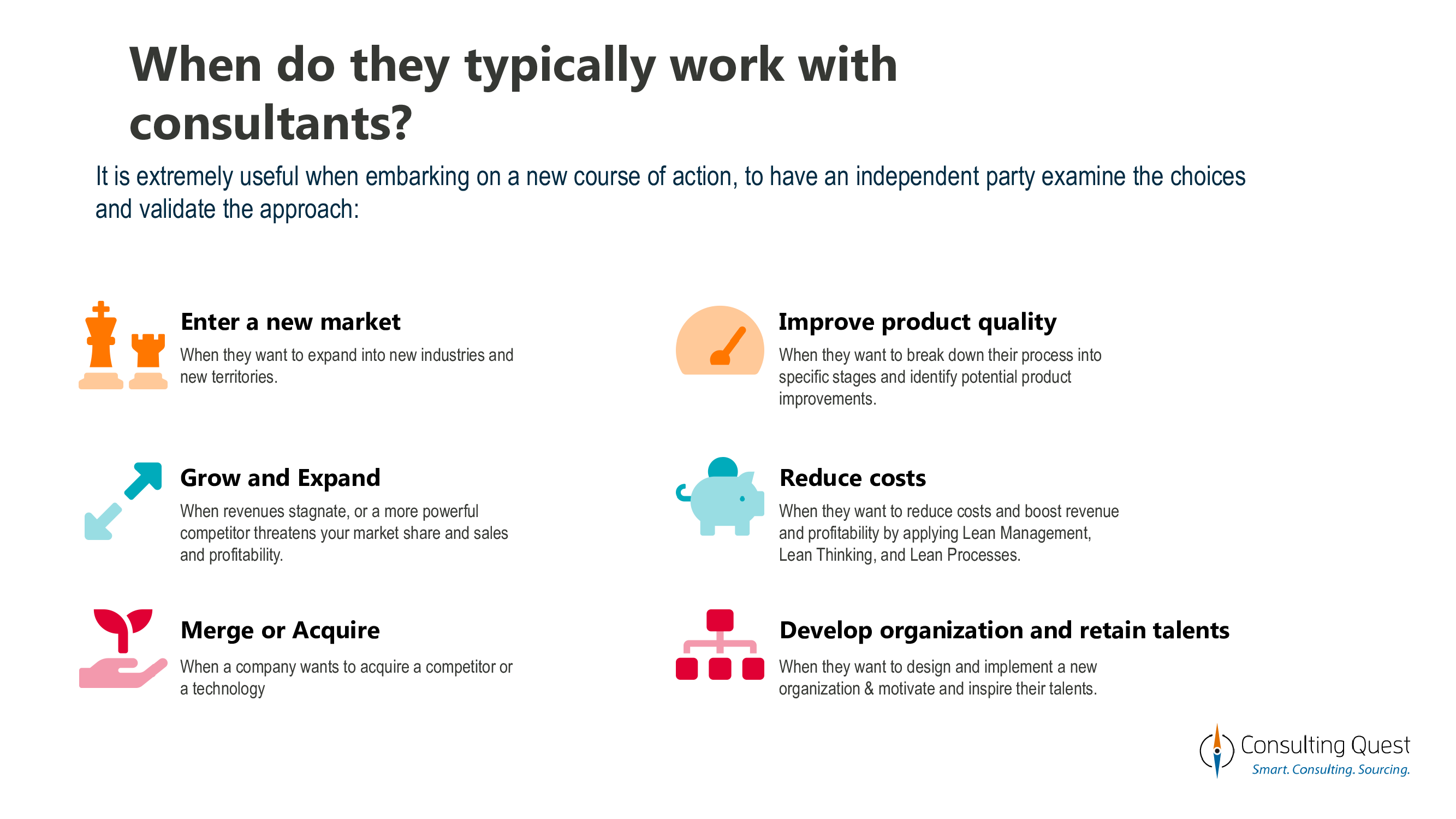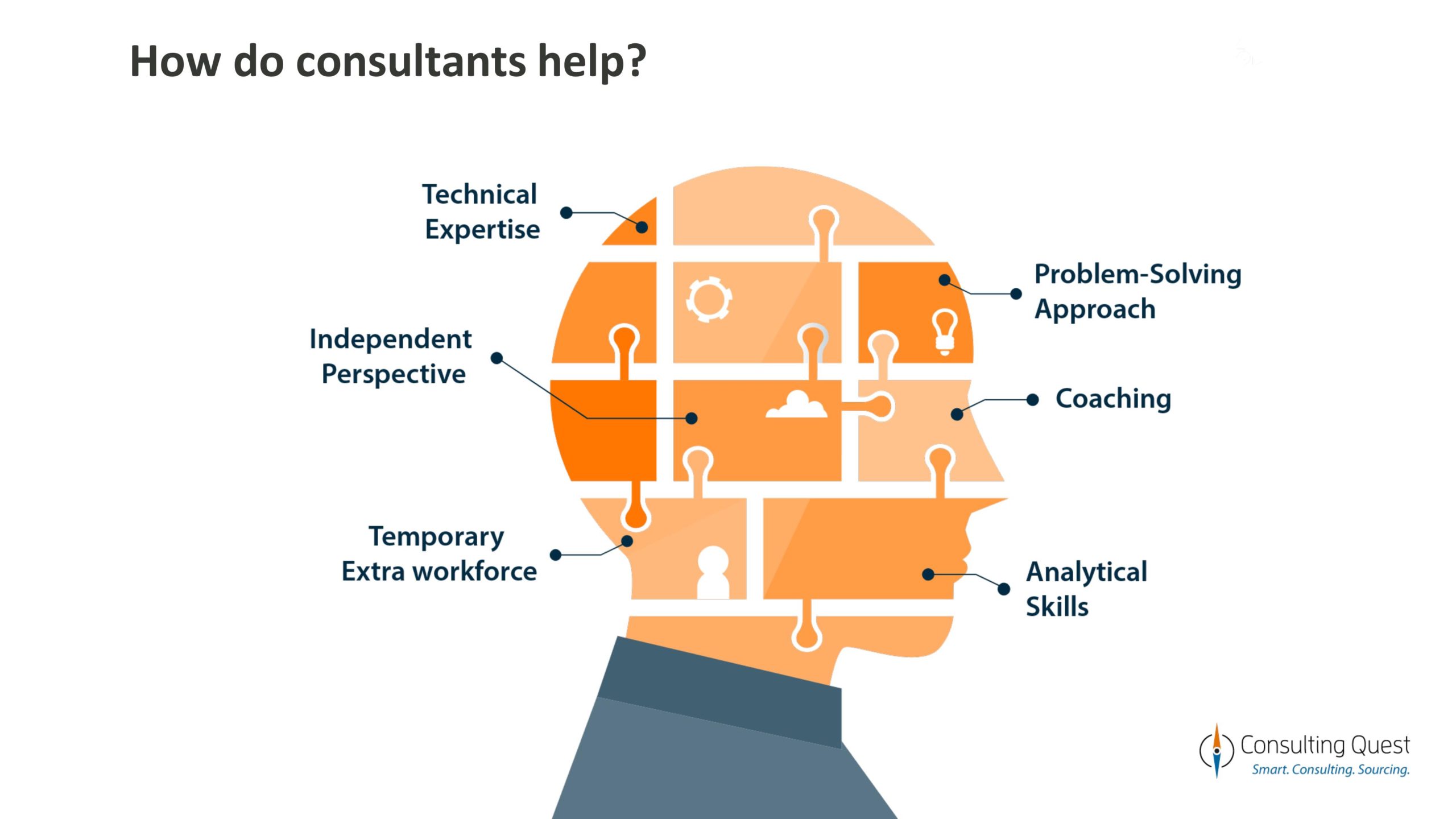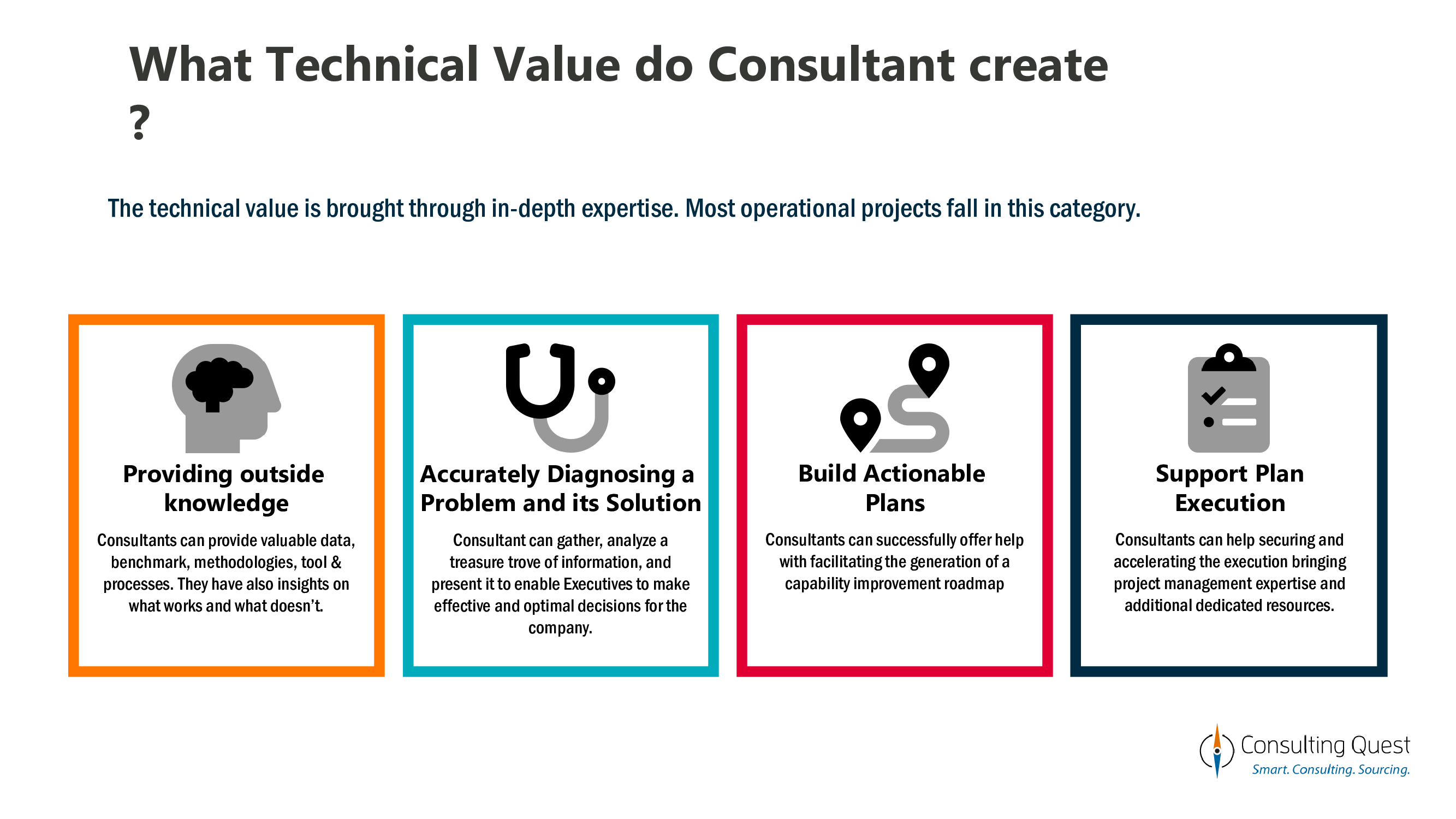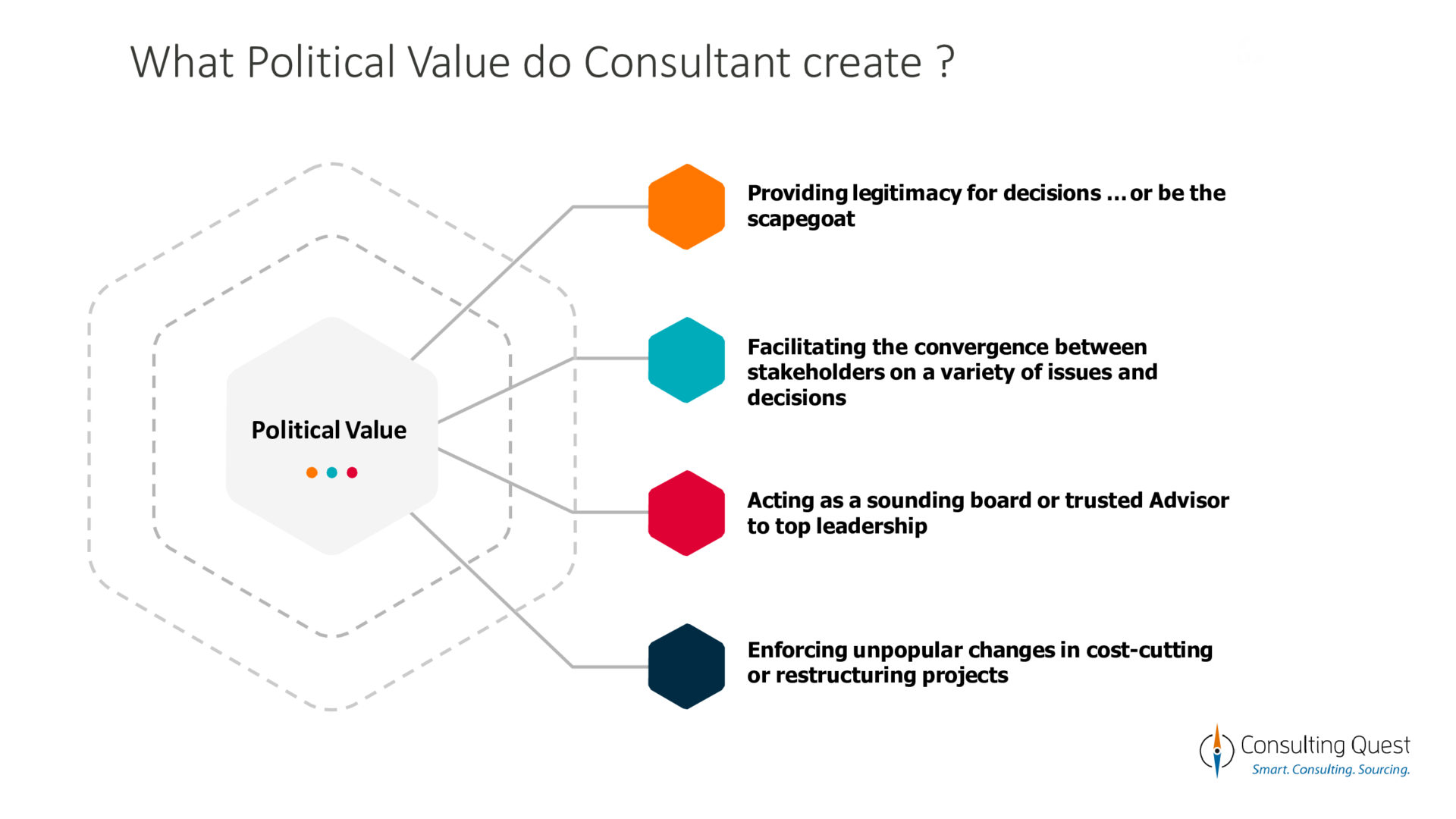Table of Contents
Consultants have been around for centuries, as you’ve read in our insight “The History of Consulting”. Their value proposition has always been the same, and that is, to use their expertise to help organizations achieve their goals. But what is a consultant, exactly? And how do they create value for their clients?
Through this insight, we will answer questions like ‘what is a consultant’ and more. We will also briefly explore the 8 essential markers in finding the right consultants as well as touch on how to measure the value of consulting.
And by the end of this insight, you’ll have a good understanding of what is a consultant, what they do and why they can be so valuable to organizations. So, let’s get started!
What is a Consultant?
‘What is a consultant?’ We can answer this question in multiple ways. But first, let’s look at where the word consultant actually originated from. Well, it actually comes from the Latin word “consultare” which means to “consult, or advise.”
Now, in layman’s terms, a ‘consultant’ can be defined in the following way:
A consultant is a professional who provides specialized advice in a particular area such as business, law, science, or technology. For businesses, consultants are usually hired to help solve problems or improve performance.
Often, consultants are brought in from outside the company to provide an objective perspective. They may also be employed on a project basis to provide expert advice or assistance with specific tasks.
As you know, consulting is a rapidly growing industry, and there are many different types of consultants available to businesses. When choosing a consultant or consultants, it is important to select the right consultants who has experience and knowledge in the specific area you need assistance with.
When Do Clients Generally Work with Consultants?
There are numerous projects in which partnering with consultants can help businesses create value more efficiently and effectively. As an external provider, a consultant is frequently able to see concerns that stakeholders and individuals with too much organizational involvement cannot.
So, when do clients generally work with consultants? Well, let’s just have a look!
#1. Entering Into New Markets to Expand Their Business
When clients want to enter new markets and expand their businesses, they often turn to consultants for help. Consultants have the expertise and experience to help clients identify new opportunities and navigate unfamiliar territory.
In addition, consultants can provide valuable insights into how to best reach target audiences and build a successful presence in new markets. By working with consultants, clients can gain the knowledge and skills they need to expand their businesses successfully.
#2. Business Growth & Expansion
Consultants help in growing their client’s business, especially when revenues have stagnated or when a more powerful competitor threatens their market share. Consultants can help businesses identify new opportunities for growth, develop strategies for expansion, and optimize operations to improve efficiency and profitability.
Moreover, in most cases, consultants are brought in to help businesses address specific challenges or problems, such as weak sales, low morale, or poor customer satisfaction. By working with a consultant, clients can get an objective perspective on their situation and receive expert advice on how to improve their business.
#3. Mergers and Acquisitions
Mergers and acquisitions are huge undertakings for any company, and they often come with a lot of risks. That’s why clients usually seek out consultants when they’re considering these types of moves.
Consultants can help to assess the risks and potential rewards of a merger or acquisition, and they can provide guidance on how to best proceed. In many cases, consultants are able to help companies avoid costly mistakes and ensure that the transition goes as smoothly as possible.
As a result, clients who are considering a merger or acquisition often turn to consultants for advice and support.
#4. Assess and Improve Product Quality
Consultants can be hired to help assess and improve a company’s product quality. When a business decides they want to take a closer look at their process and see where improvements can be made, they often turn to consultants.
The consultants help break down the process into manageable stages so that potential improvements are easier to identify. This allows businesses to make more informed decisions about how to move forward with their product.
In addition, consultants can offer guidance and support throughout the implementation process. As a result, clients who work with consultants often find that it is a worthwhile investment that can help improve their product.
#5. Cost Reduction and Revenue Boost
Many businesses today are looking for ways to reduce costs and increase profits. For this reason, they often hire consultants to help them implement Lean Management, Lean Thinking, and Lean Processes.
These consultants can help businesses to streamline their operations, improve their customer service, and boost their bottom line. In many cases, the consultants will work with the business owners and managers to develop a custom plan that fits the specific needs of the company.
Then, they will train the employees on how to effectively implement the plan. By working with consultants, businesses can save money and increase their profitability.
#6. Enhance Organization & Retain Talented Personnel
Clients work with consultants and seek help in designing and implementing a new organization, or in motivating and inspiring their talents. In either case, the consultant brings a fresh perspective and extensive experience to the table.
The client can benefit greatly from the consultant’s insights and knowledge. In addition, the consultant can provide the client with concrete tools and resources that will help them achieve their goals.
Ultimately, the decision to work with a consultant is an investment in the future of the organization. By working with a consultant, clients can increase their chances of success while saving time and money.

How Do Consultants Create Value for Their Clients?
Consultants are an important part of any firm or organization. They offer valuable insights and ideas that aid businesses in achieving their objectives. Although the job of consultants is frequently misunderstood, their contribution to a company cannot be denied.
Moreover, consultants come with the reputation of bringing a vast skillset that helps in adding value to the firm. They add value by assisting their clients in a number of ways such as improving product quality, growing and expanding the business, lowering costs, retaining valuable talent, and much more.
Moving on, consultants create value through two dimensions; namely, technical value and political value. Let’s look into these dimensions in a bit more detail.

#1. Technical Value
The technical value that consultants bring to the table is basically their in-depth knowledge and experience. The vast majority of operational projects fall under this category regardless of whether the consultants are tasked with providing external knowledge, assisting in the diagnosis of a problem and its solution, or assisting in the implementation of the solutions described above.
Now, let us take a look at these parameters more closely.
#A. Bringing in Outside Knowledge
Consultants have extensive knowledge of clients, goods, markets, and rivals. They can conduct surveys, communicate with subject-matter experts, and use analytical skills.
Moreover, consultants with a high degree of specialization generally have wide exposure to similar issues. If they’ve worked with your competitors, they are likely to utilize valuable industry knowledge to solve your problems.
#B. Diagnosing and Solving a Problem Accurately
For an organization, a major challenge is how it perceives an issue. Misdiagnosed or misinterpreted issues compound company problems and mislead the team. This, in turn, makes finding the right answer complicated and expensive.
Framing and assessing a problem leads to a methodical solution and effective recommendations. A consultant collects, evaluates, and presents information to help leaders make efficient business decisions.
#C. Create Plans That Can Be Carried Out
Consultants can help the organization generate a capability improvement roadmap. This is an actionable plan which will enable the organization to make gradual changes over time and see positive results sooner than expected! At the same time, consultants can also audit management practices for process and standard compliance and independent assessment.
#D. Encourage the implementation of the Strategy
Consultants can act as a bridge between project managers and decision-makers. They can help secure and accelerate the execution of projects with their project management expertise, bringing an extra set of dedicated resources to make sure everything goes smoothly.

#2. Political Value
The political value, on the other hand, is a lot more challenging and difficult to comprehend. However, everybody with experience is aware of the significance of workplace politics.
In times of difficulty, executives may seek support to legitimize a decision, impose unpopular changes, or serve as the scapegoat. It may also take the form of facilitating convergence among stakeholders or serving as a sounding board.
Now, let us take a look at these parameters more closely.
#A. Serving as the Scapegoat
If something goes wrong, an executive can defend a problematic decision and have the consultant take responsibility. It provides respite to the management team and is reminiscent of the plot of a popular crime thriller, with the consultant taking on the role of “bad cop” in order to carry out difficult judgments.
#B. Facilitating Stakeholder Convergence on Issues and Decisions
Let’s say, for instance, the CEO of a large US Bank relies on his advisor more than anyone else. Nobody really knows what he does or how much influence the man has, but it’s clear that without him there would be no alignment and poor relations among key stakeholders.
He facilitates these things by playing an integral role in interviews with those involved while making sure they’re satisfied – all while remaining impartial throughout everything.
#C. Playing the Role of a Trusted Advisor
As a trusted advisor, you can help CEOs bounce ideas off of you when they can’t talk to their teams. CEOs can’t talk to their leadership team about anything and everything. Also, the trusted advisor won’t have a hidden agenda and can give a second opinion without any bias.
#D. Unpopular Changes Being Enforced
Consider lowering costs and reorganizing your business. However, it can be difficult to find people willing to make unpleasant judgments or fight for the elimination of a percentage of the staff internally.

Finding The Right Consultants – The 8 Markers
Most of you have probably heard the famous saying by Warren Buffet, which says “Price is what you pay, Value is what you get.” We all know what “value” means, but when it comes to consulting services, we’ve found that this sound idea isn’t always followed.
Any organization is capable of creating value through consulting, so long as they partner with the correct provider. Unfortunately, this makes it more difficult and time-consuming for consulting purchasers to identify the best providers.
Hence, due to this, finding the right consultants can be difficult, but not when you have the 8 important markers laid in front of you. So, what are these markers and how are they beneficial? For that, let’s delve into the 8 important markers for finding the right consultants for your consulting projects.
#1. Capabilities
When you’re working with a consulting firm, it is important to understand what capabilities they will use for the project. The way that these firms present themselves may not always match up how their clients see them or describe them.
They could speak technical jargon which would be hard for someone else who isn’t from within this industry to comprehend and therefore doesn’t know where all of its terms come from. You need to act as a translator between clients/firms so everyone can get on board together!
For example, a company’s website will list its capabilities as strategy, operations, and organization. This description may be sufficient for a seasoned consulting user to understand what this consulting firm does. But it doesn’t mean much to the average executive.
#2. Industry Experience
It’s much easier to define the type of industry experience you’re seeking for. However, pay attention to the context and intended outcomes to finely define the breadth and depth of knowledge you require.
For example, if you’re interested in the Oil & Gas industry in general, your project might be about Upstream Operations, or perhaps Exploration / Production, and more specifically about Well Stimulation.
#3. Geography & Footprint
The scope of your project may require either a worldwide or a country-specific organization. Consider the areas where the consulting firm will be required to work, the languages they must speak, and the cultures they must comprehend. Consider where and how team members should interact with project leaders.
#4. Size
What policies do you have in place for small businesses or even independent consultants? What is your timeline for your project? If you have a tight deadline and several locations, a larger organization with a global operation can be a good fit. If your timeframe is more flexible and you simply require assistance in one region, you may be able to work with a smaller agency.

#5. Budget
It’s essential to know your budget before looking for consultants. Fees for consulting services might vary by up to five times from one firm to the next. It should come as no surprise that larger consulting firms charge more than smaller firms.
A consulting firm’s size is usually a good indicator for estimating consulting fees. If you’re on a low budget, little neighborhood boutiques will suffice. If your budget allows, you can explore other consulting firms of various sizes.
#6. Credibility
The three key pathways for establishing credibility are the brand, thought leadership, and partner profile.
You WILL need a brand for your project at some point. You want to work with the big players if your initiative has board exposure or if the value predicted is mostly political. They’ll have the credibility at the top of the organization and with your investors, as well as the shoulders to roll with the punches if a scapegoat is required.
Thought-leading companies can provide niche-specific insights. Say you need multi-modal transport for process industries. Your teams avoid consultants because they “know nothing.” Bring in a consultant who writes on network distribution optimization and multi-modal transportation. And voila, your team may like this consultant.
Bringing in the correct experts can also win over your teams and key stakeholders. If you’re building an intrapreneurial program to boost innovation, consider consulting firms with entrepreneurial and corporate partners. Working with procurement-experienced experts might help you optimize tail spend without a lot of resources.
#7. Delivery Model
You should consider how you want to work with your consultants. Like do you want them to assist you in diagnosing the issue or developing a strategy? Or do you want them to assist you in putting your plans into action? Rarely do consulting firms thrive at both. Furthermore, implementation consultants are typically less costly than strategy consultants.
Another factor to consider is the firm vs soft approach. Suppose you wish to reorganize and redesign your procurement team and processes. Ask yourself what your highest priority is. Is it to gain the support of your current teams? Are you seeking a collaborative strategy?
Therefore, you should seek out a consultant with a high sensitivity to change. But if completing the work is your top goal, you will need a consultant who focuses on the challenging areas of the project.
Finally, what level of experience do you require from your consultants? You’ll need advisors who can impart expertise if you wish to professionalize your staff during the process.
As a result, you should work with senior consultants who have on-the-ground experience. If you’re primarily interested in the project’s outcomes, you could collaborate with younger consultants who are overseen by a more senior colleague.
#8. Culture
Companies are becoming increasingly global. Their teams are more racially, linguistically, and culturally varied than ever before. Many aspects of business life vary from country to country, including managerial culture, business etiquette, and communication preferences.
Which Northern European has not tapped his or her fingers impatiently on the table while waiting for his or her French, Italian, or Spanish colleagues to arrive late for a meeting? And conversely, whatever Southern European has not complained about the rigidity of their French or Dutch coworkers? There are identical differences in every region of the world.
When you have a delicate project in Asia, you may choose to hire consultants that are familiar with the local culture and language. Consultants’ responsibilities include establishing trust with client teams. When 50 percent of a message is lost in translation, the exercise might become acrobatics of the highest order.
In contrast to the French, who enjoy airing their dirty linen in public, Chinese CEOs will feel humiliated by any public disagreement. In most Western countries, silence indicates permission, but in Asia, the opposite is true.
A Quick Round-Up
As you’ve read, we touched upon ‘what is a consultant’ and how they help in creating value for their clients. In fact, they create significant value for their client’s organization.
The value created by consultants can be technical in nature, such as providing expertise and solutions to various issues, cost savings, increased revenues, and so on.
They can also be political in nature, such as assisting clients in making transitions, implementing new policies, and successfully adapting to new environments, and the project’s performance can be evaluated through direct client feedback and satisfaction.
Thanks for reading! Feel free to share your feedback. Connect with us for further discussion. We will look forward to hearing your views.





